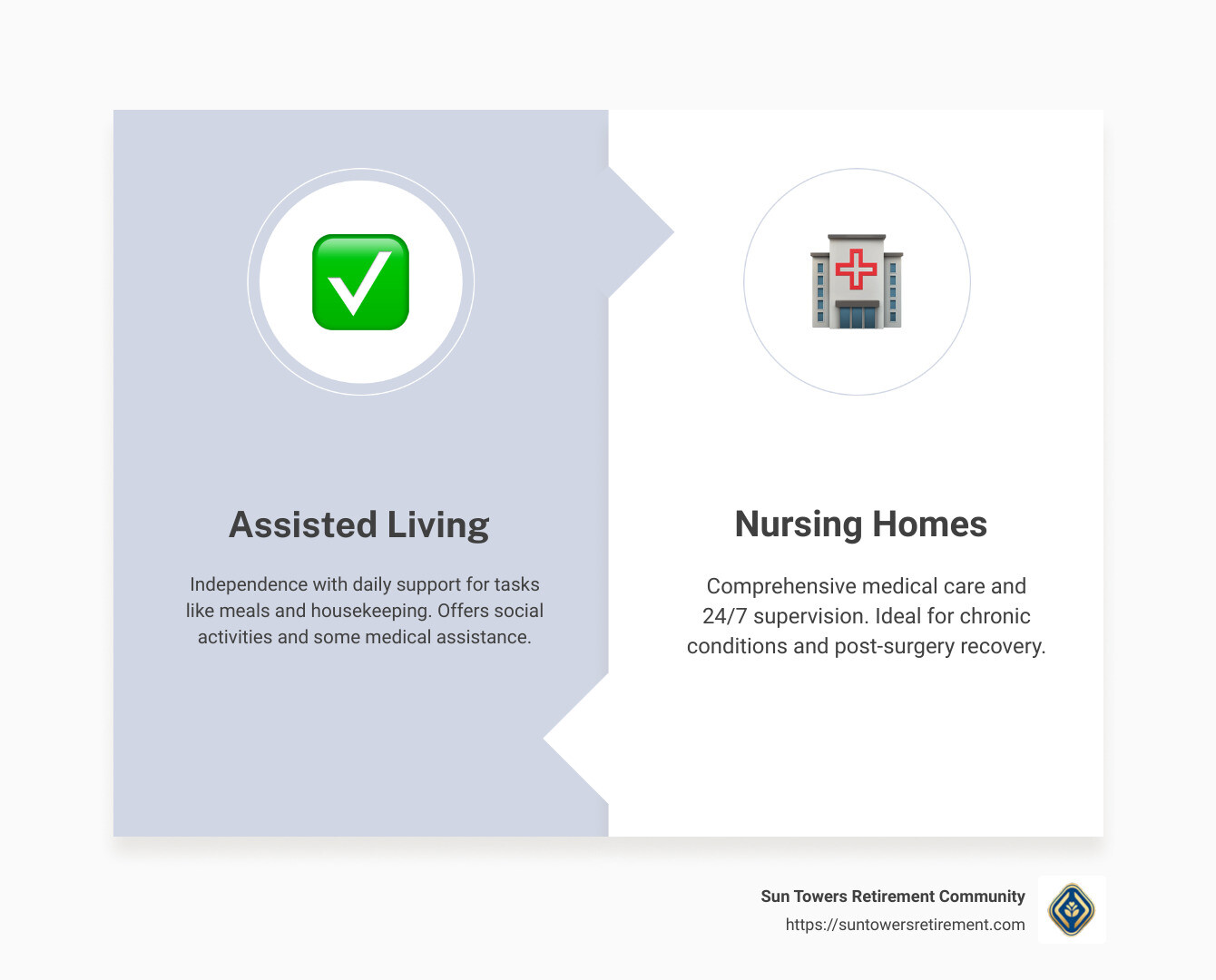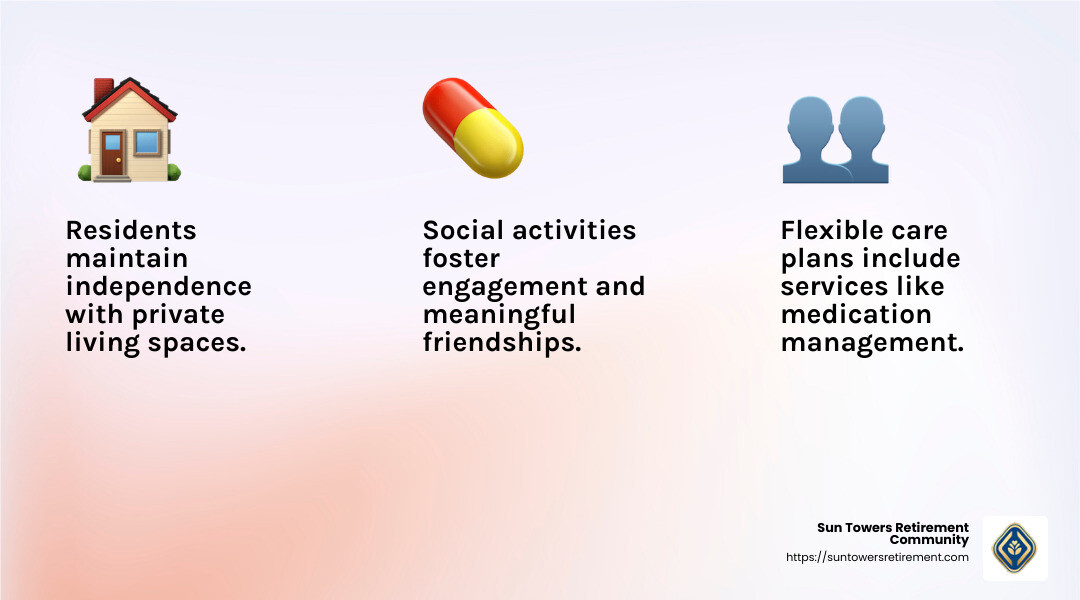Assisted Living vs Nursing Home: Top 5 Best Choices 2024
When faced with the decision of assisted living vs nursing home, understanding the differences between these senior care options can significantly impact the quality of life for your loved ones.
-
Assisted Living: Ideal for seniors who value independence but require some help with daily activities. It focuses on promoting an active lifestyle with social engagement.
-
Nursing Homes: Best suited for those needing comprehensive medical care and constant supervision due to chronic conditions or recovery from surgeries.
Making the right choice requires considering personal needs, medical conditions, and desired lifestyle. Both options offer unique benefits, but it’s crucial to align these choices with the future well-being of your loved one.
By assessing the type of support your loved one needs, you can ensure they receive the most appropriate care, whether in a community-focused assisted living facility or a medically-equipped nursing home.
Must-know assisted living vs nursing home terms:
– care centers
– nursing care facility
– skilled nursing home health care
Understanding Assisted Living
Assisted living is all about maintaining independence while getting a little help with daily tasks. It’s perfect for seniors who want to stay active and social but need some support.
Independence and Daily Tasks
In assisted living, residents enjoy their own private living spaces, which means they have the freedom to live life their way. They get assistance with activities of daily living (ADLs) such as bathing, dressing, and eating, only when they need it. This balance allows seniors to maintain their independence and dignity.
Social Activities
Social life is a big part of assisted living. Communities offer various activities like book clubs, walking groups, and outings to local attractions. These activities keep residents engaged and help them build meaningful friendships. It’s not just about keeping busy—it’s about living a vibrant life.
Personalized Care
Each resident in an assisted living community receives personalized care custom to their needs. This means that care plans are flexible and can change as needs evolve. Whether it’s medication management or physical therapy, the focus is on providing the right support to improve each resident’s quality of life.
By providing the right mix of independence, social interaction, and personalized care, assisted living communities help seniors live fulfilling lives while ensuring they have the support they need.
This understanding of assisted living sets the stage for exploring how nursing homes differ, especially in terms of medical care and supervision.
Exploring Nursing Homes
Nursing homes are designed for seniors who need more intensive care and medical supervision. They offer a higher level of support than assisted living, making them suitable for those with complex health needs.
Medical Care
Nursing homes provide comprehensive medical care. This includes 24/7 access to healthcare professionals who can address a wide range of medical issues. From managing chronic diseases to providing emergency care, nursing homes are equipped to handle it all.
Skilled Nursing
At the heart of nursing homes is skilled nursing. This means care provided by licensed nurses who can perform medical tasks that go beyond basic assistance. For instance, they can manage wound care, administer IV medications, and monitor vital signs. This level of care ensures that residents receive the medical attention they need.
Rehabilitation Services
Many nursing homes also offer rehabilitation services. These include physical, occupational, and speech therapy. Such services are crucial for seniors recovering from surgery or illness. They help residents regain strength, improve mobility, and improve their overall quality of life.
Managing Chronic Conditions
For seniors with chronic conditions, nursing homes provide ongoing management and support. Conditions like diabetes, heart disease, and dementia require careful monitoring and regular medical intervention. Nursing homes have the resources and expertise to manage these conditions effectively.
In summary, nursing homes are ideal for seniors who need continuous medical care and supervision. They provide a safe environment where complex health needs are met by skilled professionals. This makes them a vital part of the senior care landscape, especially for those requiring extensive medical support.
Assisted Living vs Nursing Home: Key Differences
When choosing between assisted living vs nursing home, understanding the key differences can help you make the best decision for your loved one. Let’s break it down into four main areas: level of care, cost, living environment, and medical services.
Level of Care
Assisted living provides support with daily activities like bathing, dressing, and medication management. It’s ideal for seniors who need some help but still want to maintain a level of independence. Residents enjoy a community setting with social activities and personal care custom to their needs.
In contrast, nursing homes offer a higher level of care. They are designed for individuals who require 24/7 medical supervision and support. This is crucial for those with serious health conditions or those recovering from surgery.
Cost Comparison
The cost of care varies significantly between the two options. Assisted living generally costs less because it offers fewer medical services. The monthly fee typically covers room, board, and basic assistance.
Nursing homes, however, are more expensive due to the comprehensive medical care provided. Costs can be covered by private funds, long-term care insurance, or government programs like Medicaid, depending on eligibility and financial circumstances.
Living Environment
In assisted living, residents often have their own apartments or rooms, allowing for privacy and personal space. The environment is designed to feel more like home, with shared dining areas and recreational spaces.
Nursing homes usually have a more clinical setting. Rooms may be shared, and the focus is on providing medical care and supervision. While they also offer communal areas, the atmosphere is often more structured to ensure safety and health.
Medical Services
Assisted living facilities provide limited medical services, such as medication management and health monitoring. They might have nurses on staff and offer on-site therapy services through external partners.
Nursing homes excel in medical care, offering skilled nursing services and rehabilitation therapy. They have licensed healthcare professionals available around the clock to manage complex medical needs, ensuring residents receive comprehensive care.
Understanding these differences helps in making an informed choice between assisted living vs nursing home. Each option caters to different needs and lifestyles, so consider the level of care required, financial factors, and personal preferences when deciding the best fit for your loved one.
Choosing the Right Option for Your Loved One
Selecting between assisted living vs nursing home care is a significant decision. It involves assessing your loved one’s needs, considering lifestyle preferences, understanding financial implications, and involving family members in the process.
Needs Assessment
Start by evaluating what kind of help your loved one needs daily. Do they need assistance with basic tasks like dressing or bathing? If so, assisted living might be suitable. It provides help with daily activities while promoting independence.
However, if your loved one requires constant medical care or supervision due to serious health issues, a nursing home could be the better choice. These facilities are equipped to handle complex medical needs and provide 24/7 care.
Lifestyle Preferences
Consider what lifestyle your loved one desires. Assisted living communities focus on providing a vibrant and active environment. They offer social activities, personal freedom, and a home-like setting, which can be ideal for those who value their independence but need some support.
On the other hand, nursing homes offer a more structured and clinical environment. They are perfect for individuals who need more comprehensive care and may not be able to participate in numerous social activities.
Financial Considerations
Understanding the financial aspects is crucial. Assisted living is generally less costly since it offers limited medical services. Costs often cover housing, meals, and basic care.
Nursing homes are more expensive due to the extensive care they provide. It’s essential to explore options like long-term care insurance, Medicaid, or other financial aid programs to help manage these expenses.
Family Involvement
Involve family members in the decision-making process. Discuss the options openly and consider everyone’s input, especially your loved one’s. This ensures that the decision respects their wishes and meets their needs.
Family members can also help in researching facilities, visiting potential options, and understanding the nuances of each type of care. This collaborative approach can make the transition smoother and more comfortable for your loved one.
Choosing between assisted living vs nursing home care is about finding the right balance between support and independence while considering financial and personal preferences. By carefully evaluating these factors, you can make a decision that best suits your loved one’s needs and lifestyle.
Frequently Asked Questions about Assisted Living vs Nursing Home
What are the main differences between assisted living and nursing homes?
The primary difference between assisted living vs nursing home care lies in the level of care and independence offered. Assisted living communities provide support with daily tasks like bathing, dressing, and medication management. They are designed for seniors who are mostly independent but need some assistance. These communities foster a vibrant social life, allowing residents to engage in activities and maintain personal freedom.
Nursing homes, on the other hand, cater to individuals requiring extensive medical care and supervision. They offer 24/7 skilled nursing services for those with chronic conditions or severe health issues. This includes medical monitoring, rehabilitation services, and assistance with daily living activities. The environment is more structured and medical-focused, suitable for those who need constant care.
How is assisted living typically paid for?
Paying for assisted living can be managed through various means. Many residents use private funds, which might include savings, pensions, or the sale of a home. Long-term care insurance is another option, as it covers some costs associated with assisted living. Policies vary, so it’s crucial to review what services are included.
Medicaid can also assist with payment, but eligibility and coverage depend on state regulations. It’s important to explore these options early to ensure financial resources are in place when needed.
At what age do most people move to assisted living?
The age at which individuals transition to assisted living varies widely. While there’s no set age, many seniors make the move in their late 70s to early 80s. However, the decision is highly personal and influenced by health factors and lifestyle preferences.
Some choose assisted living to enjoy a community lifestyle and reduce the burden of home maintenance. Others may move due to health changes that require additional support. The timing depends on each person’s unique circumstances and needs.
Conclusion
Choosing between assisted living vs nursing home care is a significant decision in the journey of aging. At Sun Towers Retirement Community, we understand the importance of finding the right fit for you or your loved one. Our goal is to provide a seamless continuum of care that adapts to your changing needs, ensuring you can age in place with confidence.
Sun Towers Retirement Community offers a holistic approach to senior living. Our services span from Independent Living to Assisted Living, Memory Care, and Skilled Nursing. This continuum of care means you don’t have to move to a new facility as your needs change. You can remain within the same supportive community, surrounded by familiar faces and a caring environment.
Personalized services are at the heart of what we do. We tailor our care plans to meet the unique needs and preferences of each resident. Whether it’s assistance with daily tasks or comprehensive medical care, our team is dedicated to enhancing your quality of life.
Aging in place is more than just a concept; it’s a commitment to providing a nurturing and engaging environment where you can thrive. At Sun Towers, we focus on promoting independence while offering the support you need to live a fulfilling and dignified life.
Explore the possibilities with us and find out how our Skilled Nursing Facilities can cater to your needs. We’re here to help you make informed decisions about your future, ensuring that every stage of your journey is as comfortable and rewarding as possible.





















